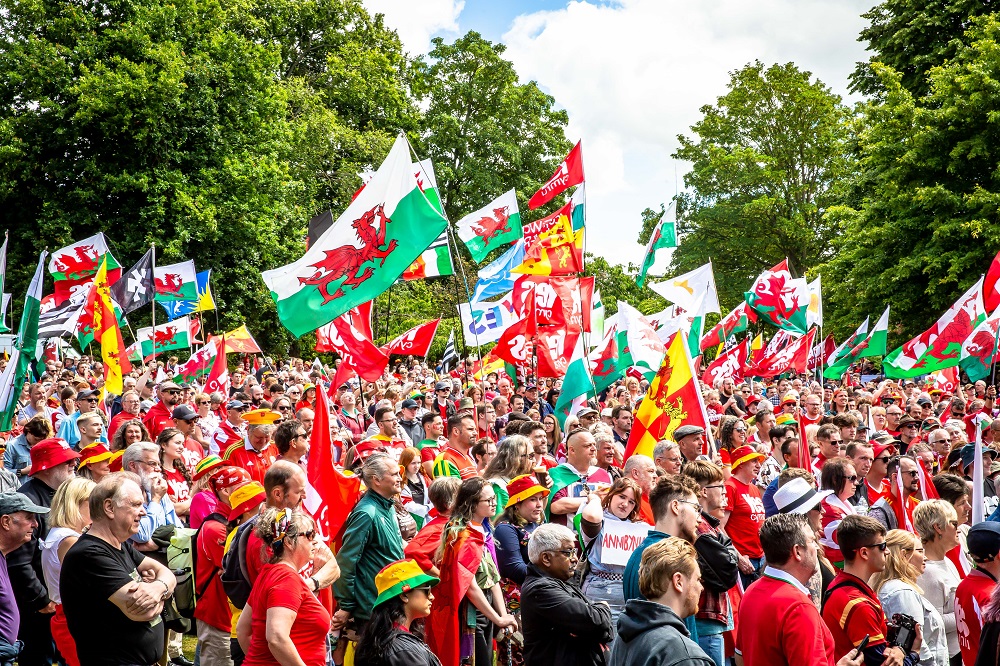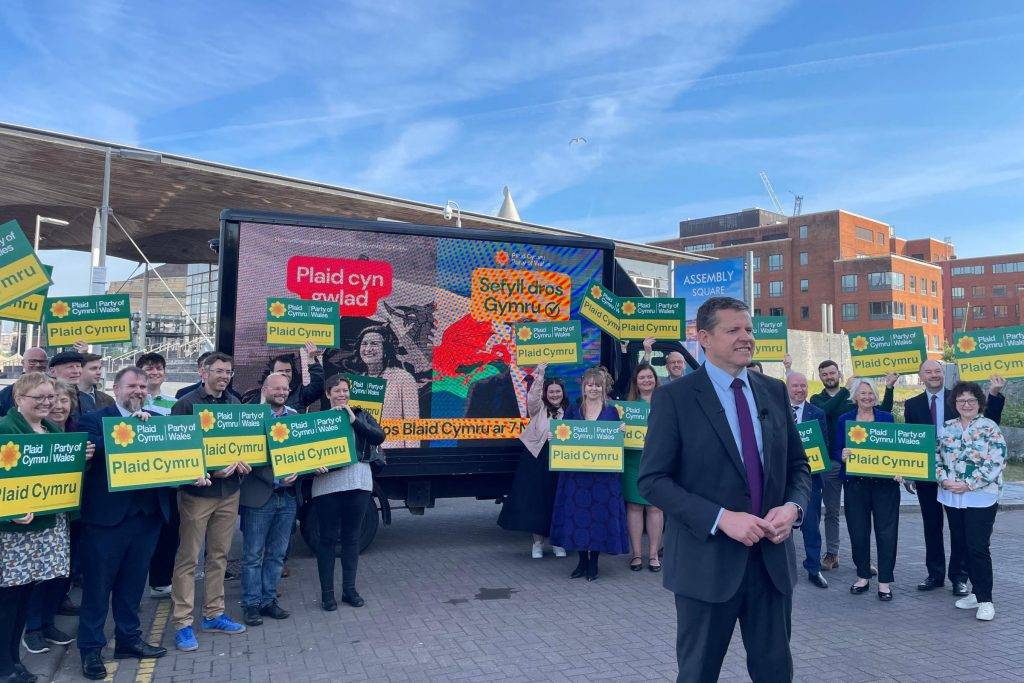Cliff Notes – Welsh independence is top priority as Plaid Cymru serious contenders contenders to form next government
- Welsh independence is top priority as Plaid Cymru leader Rhun ap Iorwerth urges Welsh voters to have their say and learn from the SNP’s successes, and unleash the nation’s full potential.
- There is growing support for Welsh independence among young voters, who want to rejoin the EU and end the wars, though ap Iorwerth has ruled out a referendum during his first term.
- Concerns over funding fairness for Wales compared to Scotland have been raised, with Labour MP Stephen Kinnock calling for a reassessment of the funding formula.
- Brexit has hurt Nigel Farage’s chances in Wales, as Brexit cost Wales billions in funding and regeneration projects.
Welsh independence will unleash ‘full potential’ as nationalists serious contenders to form next government
The Welsh has always felt they have gotten the short straw from Westminster, and despite promises from Labour and previous Tory governments, nothing has really changed. So it is no surprise that Plaid Cymru have listed Welsh independence is top priority.
Like most of the poorer areas of the UK, Wales was hit hard from Brexit, losing billions in funding and regeneration grants for projects from the EU and are now at the bottom of the pecking order in Labour’s reform plans.
Wales should “learn” from the SNP’s successes in Scotland, according to the man who could well be the next first minister of Wales as Plaid Cymru serious contenders for the next election.

Plaid Cymru leader Rhun ap Iorwerth said in an interview: “I believe that we will not be able to fully release our potential until we’re an independent nation.”
He admitted “not everybody agrees” but believes there should be a discussion about how to “edge things forwards” on independence.
The party leader has ruled out a referendum in his first term but says support for Welsh independence is growing among young voters, who want to have a say in rejoining the EU and to be able to say no to war and genocide in the middle east.
Mr ap Iorwerth, whose party is ahead in the polls to lead the Welsh Parliament next year, says his party takes “very, very seriously the positive impact” the SNP has had in Scotland.
It comes as a government minister admitted there are “major” questions about how fairly Wales is funded compared with Scotland.
The Barnett formula is out of date
Stephen Kinnock, the Labour MP for Aberafan Maesteg, said he and other Welsh MPs are looking for a reassessment of the funding formula.

He said the Barnett formula, which decides the allocation of much of the funding from the treasury to devolved nations, works “much better” for Scotland and the industrial heritage and age demographics in Wales mean the nation has been historically underserved.
However, some Welsh Labour MPs fear the growing nationalist tide could mirror Scotland’s 2007 shift.
Lessons “have not been learned” from Scotland, Labour Member of the Welsh Parliament Lee Waters said.
Speaking to the Labour List website, he warned: “The control of the party machinery by London HQ, and the disdain of Westminster MPs towards their devolved counterparts were features now and then.”
Mr Waters sounded the alarm for Welsh Labour, adding: “Scottish Labour paid the price for it in 2007. The SNP seized on its chance to form a minority government and used it to build a generation of dominance. Plaid Cymru aim to do the same.”
Does Wales get treated unfairly?
It’s a question that could propel Plaid Cymru to power in Wales this time next year – a seismic political shift in a nation dominated by Welsh Labour since devolution began.
The closure of the blast furnaces at Port Talbot, the end of virgin steelmaking in this country, drew comparisons with the government’s intervention at Scunthorpe in Lincolnshire. Why was an English steelmaking site saved and not a Welsh one?
The answer, as Wales MP and government minister Stephen Kinnock tells me, is not straightforward.
Dominated by Welsh Labour
The owners of Scunthorpe were “actively sabotaging the blast furnaces”, and Labour were not in power in Westminster when decisions about Port Talbot were being made.
“You have to set the bar really high when you’re going to, as a government, go in and seize the assets of a private company,” he said.
But Port Talbot has become symbolic of something bigger, and it’s not just about steel it is about controlling the money supply in Wales.
Westminster is hurting Welsh Labour
Last month, a new railway line between Oxford and Cambridge was classed as an England and Wales project, meaning Wales does not get a share of funding, and earlier this year Wales’ first minister said the allocation of HS2 funding was “unfair” for Wales.
However, Wales was awarded £5bn in revenue and capital over three years, largely for rail infrastructure, in the spending review last month.
But Welsh Labour’s Eluned Morgan may not have done enough to distance herself from the national party.
Jac Larner from Wales’ Governance Centre at Cardiff University says her emphasis on the close relationship between Welsh and UK Labour echoes the message from Scottish Labour before their vote collapsed. It makes it “easier for voters to punish both” he said.
Reform UK (Brexit Party) lurking in the waters
Launching his party’s so-called contract with voters in Merthyr Tydfil, Nigel Farage said Wales has been “let down”.
The Reform UK leaders’ progress in Wales has been notable, but as has that of a lesser known party leader, Plaid Cymru’s Rhun ap Iorwerth.
Reform UK (formally known as the Brexit Party) are lurking in the waters and trying to tap into the local mood of discontent in Wales.
Leader Nigel Farage has put re-industrialisation ( another way of describing the money lost due to Brexit) at the centre of his pitch and even pledged to reopen Port Talbot’s steel blast furnaces.
In last year’s general election, Reform UK came second in 13 of the 32 Welsh constituencies.
But many people do not trust Nigel Farage in Wales, for several reasons; first his stance on Brexit, that cost Wales Billions in EU funding and secondly, he has been exposed as taking money from far-right nationals from America and the Israel lobby. Which makes people question, is he really Britainns first? or just a hired gun.
Can Jeremy Corbyn’s news party make inroads in Wales?
Can Wales’ nationalist party and Corbyn’s new party make inroads in Wales? Both parties are fishing in the same waters for disillusioned Labour voters and the anti-war communities.
They will have to take lessons from the SNP in Scotland, but crucially, if Farage is able to dismantle the Tory vote, these two should be able to take credence from Labours growing disillusioned party.
Both have a real shot at power in Wales.



